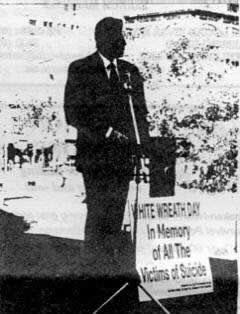Queensland Newspaper

By ELAINE WILSON
SITTING in a quiet corner of a Broadbeach cafe discussing the aims of the White Wreath Association, Fanita Clark suddenly points at a man sipping coffee a few table away.
“Suppose that man suddenly fell on the floor suffering a heart attack,” she says. “How would people react?
“What would happen is they would all rush round to see if he was OK, loosen his clothes to help him breath, someone would call an ambulance, he’d be taken to hospital, doctors and nurses would swarm around, he’d be given tests, sent to specialists and get ongoing treatment.”
But, she said, suppose the man stood there and polled out a knife and slashed his wrists – people’s reaction would be totally different. “They’d pull back in horror and not want to get involved, they’d call an ambulance but they’d say ‘He’s stupid’ or ‘He deserves what he gets’.
“If he was lucky, he’d be sent to hospital for a day or maybe two and then released and sent home with a heap of medication and told to come back in a month. “Why are people who attempt suicide treated so differently from people with any other serious condition – it’s a mental illness and they need to be treated, not brushed aside.”
Fanita said the White Wreath Association’s own research showed that in 100 per cent of cases where people had attempted suicide, they would eventually ‘complete the job’. She said it was also a common misconception that people who talked about committing suicide wouldn’t do so – they do. Yet Fanita said the association had reams of anecdotal evidence to show that people who attempted suicide were fobbed off by the medical profession and by society. The experience with her own son, she said, was typical.
“What I went through as a parent I wouldn’t wish upon anybody,” she said. “For months Jason had been having mood swings and was very depressed and I said to him something was wrong and he should see the doctor. “Finally, in December 1998, he agreed and the doctor referred him to the mental health clinic, where they put him on medication and sent him home and said ‘Come back in four weeks’.
“I’d been crying myself to sleep every night worrying about him, so at first I thought, great – he’s admitted he has a problem and he’s going to get help. It was like a great weight off my shoulders. “But as soon as he went to this new doctor they invoked the confidentiality clause and said I was not allowed to be involved in his treatment or even know anything about what was going on… “If it was any other illness it would be different but because it’s a mental illness, these shutters come down.”
In February, Jason attempted twice to kill himself – the second time by overdosing on his prescribed medication. But after three days in a mental health unit he was sent home – with more drugs. In May he laid himself in front of a train. Through the whole ordeal, Jason had been living at home but his family had been excluded from involvement in his case.
Fanita said the ‘Don’t want to know’ attitude was not confined to the medical profession – the stigma of mental illness extended throughout society so families were generally left to cope alone.
A poignant letter to the White Wreath Association from a grieving father tells the story.
In part he wrote: ‘My son’s suicide is no less a tragedy to me and I believe he was as much a victim to the ills of our society as were the victims of the Port Arthur massacre.
“But they are at least, rightfully, received a great deal of help and perhaps some comfort in society’s response and support.”
“Only with caring, compassion and the facilities to take care of our children can fight this epidemic of despair.”
The White Wreath Association, with its subtitle: Action Against Suicide, is determined to lead that fight.
“Society must be made aware and must understand. People who commit suicide are sick… and it’s the system which kills them,” she said.
